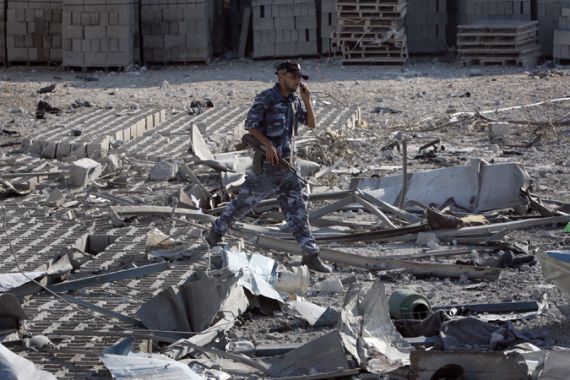Gaza-Israel violence continues despite truce
Exchange of attacks continues despite Palestinian factions agreeing to informal truce on launching rockets into Israel.

Cross-border exchanges of air strikes and rocket attacks between Israel and the Gaza Strip have continued for a third day, despite Palestinian factions having agreed to an informal ceasefire on launching rockets into Israel.
The agreement was reached “on condition that Israel halts its attacks”, a Hamas official told the AFP news agency late on Sunday night.
Mark Regev, the spokesman for the Israeli prime minister, told Al Jazeera that the Israeli government was not commenting on reports of a truce.
The ceasefire calls came hours after the Arab League condemned the Israeli raids on Palestinians in the Gaza Strip during an “urgent meeting” in Cairo. The bloc called on the international community “to put pressure on Israeli occupation authorities … to halt this brutal assault”.
The meeting came a day after Israeli ministers held their own emergency session on Saturday night to discuss the violence, after an Israeli man was killed that evening by a rocket strike in the southern city of Beersheva.
Shortly after announcement of the informal accord, two rockets from Gaza fell near the southern Israeli city of Ashkelon, Israeli officials said.
The explosions were followed by fresh Israeli air strikes against Jabaliya in northern Gaza and Khan Younis refugee camp in the strip’s south, Gaza residents said.
Rising toll
At least nine Palestinians, including a 13-year-old boy, were wounded on Sunday from Israeli drones and F-16 fighter jet attacks, Al Jazeera’s producer reported from Gaza City.
The jets targeted a Hamas police station and a military training camp belonging to the al-Ahrar movement, our producer said.
More than 27 rockets fired from Gaza fell in southern Israel, hitting an empty school, though no serious injuries were reported, Israeli army officials said.
The tally excluded the number of rockets intercepted by Israel’s Iron Dome rocket defence system, the officials said, declining to give the exact figure.
Gaza-based factions – the Islamic Jihad and Popular Resistance Committees – claimed responsibility for firing more rockets and mortars into Israeli towns.
Meanwhile on Saturday, Israeli air strikes on Gaza left a Palestinian man seriously wounded.
Eilat bus attacks
|
Cal Perry and Elif Ural report live from Israel and Gaza |
Israeli aerial attacks on Gaza have killed at least 15 people, among them gunmen and five civilians including three children, since gunmen killed eight people near the Red Sea resort of Eilat on Thursday.
Israel blamed that attack on Palestinian fighters who had entered southern Israel from Gaza via Egypt.
Yoav Mordechai, the Israeli army’s chief spokesperson, told Israel Radio on Sunday that Israeli forces would “not hesitate to widen its actions and to respond with as much force as is needed”.
Seven other people, including two children, were wounded by more than 50 rockets fired from Gaza on Saturday.
“When we talk to them [people in Gaza] are expecting a harsher response,” Al Jazeera’s Elif Ural, reporting from Gaza, said.
“People in Gaza are very scared, fear is the word that describes the streets.”
The blame game
The Popular Resistance Committees (PRC) claimed responsibility for Saturday’s deadly rocket strike in Beersheva. Hamas’s armed wing claimed responsibility for another attack that destroyed a home in the town of Ofakim.
It was the first time in months that Hamas had declared its involvement in rocket attacks against Israel, after largely observing a de facto truce since the end of a three-week offensive in January 2009.
Al Jazeera’s Cal Perry, reporting from Jerusalem, said that Israel held Hamas, which governs Gaza, responsible for the rocket attacks.
“Hamas has called off the ceasefire that was in place with Israel, largely due to the violence and the continued strikes that we see from Israeli aircraft, killing at least 15 Palestinians,” our correspondent said.
“They do blame Hamas whenever anything originates from Gaza, be it a rocket attack from the south – we have seen 70 of those since Thursday – or an attack like we saw from southern Israel.”
Akiva Eldar, chief political commentator for the Israeli newspaper Haaretz told Al Jazeera: “I don’t think that Hamas has any interest in this right now and I think they were doing everything to avoid taking the blame for undermining the diplomatic attempts.”
World powers on Saturday expressed concern over the ongoing violence.
A statement in Brussels from the diplomatic quartet of the European Union, Russia, the United Nations and the United States said they remained “concerned about the unsustainable situation in Gaza as well as the risk of escalation, and calls for restraint from all sides.”